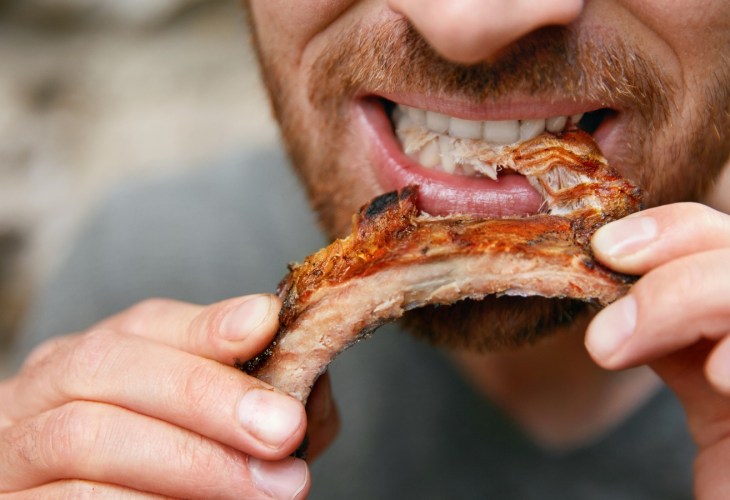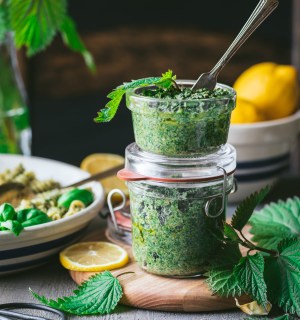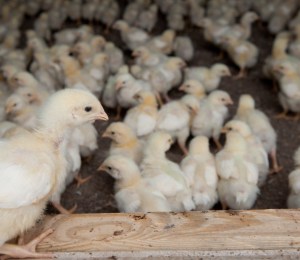“Sorry vegans! Australian study finds eating MEAT correlates to a longer life expectancy,” say the Daily Mail headlines. The research compared life expectancy with meat consumption among the populations of 175 countries based on data from the Food and Agricultural Organisation (FAO) of the United Nations.
Researchers found that countries with a greater meat intake also have greater life expectancy and decided the two were related. Interestingly, beer and wine come out relatively near the top among some of the high-meat consuming countries too!
The FAO’s most recent data lists the top five meat consumers as Hong Kong, the US, Australia, Argentina, and Spain. The bottom five were Ethiopia, India, Bangladesh, Democratic Republic of the Congo, and Burundi.
It’s not surprising to see a discrepancy in life expectancy between these two groups. But surely education, income, public health spending, and access to clean water, among many other factors, have a larger impact on life expectancy than meat intake?
Scientists say that Hong Kong’s leading longevity, for example, is “the result of fewer diseases of poverty while suppressing the diseases of affluence.” A combination of prosperity and low levels of smoking helps.
While researchers accounted for some differences (e.g., calories consumed, wealth, urbanization, obesity, and education), they acknowledged shortcomings in their study. They wrote: “Nutritional variations among countries include many more variables than those included into this study.”
They didn’t compare the quality of foods being eaten in different countries – a significant flaw!
Fact and fiction
Much of this study appears to reflect opinion rather than fact. The authors said: “A recent dietary advice published by Lancet Public Health advocates an increase of dietary meat in order to benefit our heart health and longevity.”
But it didn’t. The research advocated carbohydrates making up 50 percent of energy in “a balanced diet that includes fruit, vegetables, legumes, whole grains, nuts, fish, dairy, and unprocessed meats – all in moderation.” In fact, the EAT Lancet Commission says: “A diet rich in plant-based foods and with fewer animal source foods confers both improved health and environmental benefits.”
They question the link between saturated fat in red meat and the onset of atherosclerosis (furring up of the arteries) contravening all official guidance which warns against saturated fat. They also question the huge body of evidence linking meat with disease, saying, “there has been no clinical trial evidence to consolidate the putative negative effects of processed meat consumption for human health.” Are they questioning the World Health Organisation’s finding, along with a wealth of other evidence, that processed meat is a Group 1 carcinogen and causes cancer? This is wilfully misleading!
The research showing how meat harms, they say, is not reflected in official healthy food guidelines. But it is; the UK government’s Eatwell Guide encourages people to consider alternative sources of protein to meat. It reads: “Pulses, such as beans, peas and lentils, are good alternatives to meat because they’re lower in fat and higher in fiber and protein, too.”
It advises eating less red and processed meat like bacon, ham, and sausages too.

An outdated understanding
The new study attempts to discredit “vegetarian research,” criticizing the methodology of a number of highly respected large-scale studies. The reputable Seventh-Day Adventist studies, for example, take many more variable and confounding factors into account than this study, as does the large EPIC-Oxford study that has reported many health benefits for plant-based diets.
Lastly, the researchers say: “From the evolutionary point of view, meat has arguably been an indispensable component in human diet for millions of years, which is evidenced, genetically, by meat digesting enzymes and digestive tract anatomy.” This demonstrates a naïve and outdated understanding of human evolution and physiology.
Just consider our blunt soft fingernails, our short canine teeth, and amylase, for example, the enzyme produced in our pancreas and salivary glands that helps us digest carbohydrates.
We are much more suited to a plant-based diet than one containing meat. And evidence shows that our Palaeolithic ancestors ate a much more plant-based diet than previously thought. The average life expectancy of our ancient ancestors was just 25 years. So, even if they did live on a diet packed with meat (they didn’t) they simply didn’t live long enough to develop heart disease. Not a good starting point for modern dietary recommendations.
Earlier this month, research based on meta-analyses and data from the Global Burden of Disease study published in the journal PLOS Medicine, reported how dropping meat, dairy, and sugary foods and eating more pulses, whole grains, fruit, vegetables, and nuts could increase your life expectancy by more than a decade. Much better evidence-based advice!
Find out how evolution shaped us to be naturally vegan here.














Leave a Comment
Plant Based News Comment Policy
In short:- If you act with maturity and consideration for other users, you should have no problems. Please read our Comment policy before commenting.
Their studies are flawed. Ours? Oh. Take our studies to the bank. lol. Most studies are flawed and have confounding factors.
The study is only classed as misleading because it counters vegan dogma. It would never be classed as misleading if it were a criticism of animal foods. The truth of the matter is that nearly all of these studies, whichever way they are biased, are “observational” no causal link is established.
The author of this article would be well advised not to write on subjects of which she has no understanding, The paragraph on the Palaeolithic is the sort of thing I would expect from a 10 yr old. A better understanding of current research by Palaeoanthropologist would not come amiss.
You are an expert on the Paleolithic period Rowland? No. You are bought into the myths that have been recently exposed as selection bias. That meat lead to a growth in brain size. When we now know it’s the consumption of cooked starches.
Evidence?
“No sustained increase in zooarchaeological evidence for carnivory after the appearance of Homo erectus”
“The evolution and changing ecology of the African hominid oral microbiome”
There are a couple of journal articles to get you started. Seems like it’s been quite a while since you’ve taken a look at this topic.
I’m not to sure what your references prove? It seems that a summary of what they are saying is that carnivory did not increase during the transition from Erectus to Homo, not that it didn’t exist, so what’s new? It’s merely an extension of Wrangham’s hypothesis that cooking made us smart ( proven incorrect by many a Palaeoanthropologist ). Proving that Erectus consumed cooked tubers doesn’t mean they were a staple. What people like Wrangham conveniently forget is that Hominin and pre Hominin cranial capacity had already increased almost threefold before the advent of cooking ( over nearly 5million years ) and without any large scale consumption of starches ( if at all ). What they also seem not to understand is that it takes an already intelligent species to control fire and cook. The increased cranial capacity of Erectus to Sapiens was approx 50% and in the last 40,000 yrs has decreased by 11% at a time when cooking was universal. Non of these academics seem to have worked out that the diet of non agricultural peoples is dependent on what is available according to geography, climate, season etc. People like Paleo dieters and vegans who claim to know what pre- agricultural people ate are living in cloud cuckoo land. There’s not much point in an Inuit trying to harvest Mongono nuts or a Bushman trying to hunt seals. With the exception of tribes in northern latitudes nearly all hunter gatherers diets contain a higher percentage of plants to animal foods, and probably always have.
With regard to everyone dropping dead at the age of 25 it has long been regarded that people such as these lived in family groups with the parents as providers and grandparents as educators.
I think it shows that someone such as yourself that believes that starches are simply “empty calories” is clearly wrong. To the contrary, eating cooked starches is what drove evolution and our brain size increase. Starches are nothing more than long chains of glucose after all. The brain runs on glucose. Our multiple copies of the amylase gene really single us out as starch specialists. So any claim that the consumption of meat made us human is wrong. It places meat into the role as nature’s junk food. Delicious, high calory, occasionally consumed, but ultimately bad for the individual’s health.
Clearly meat eating does not help an individual live longer. The opposite is true.
In your opinion, which comes from a fixed position ie. Belief.
First a couple of corrections: I used the term “filler paste” not “empty calories” Starchy foods contain more sugar and less phytochemicals than fruits and vegetables. I also can’t remember using the word “meat”
So which of the UNDISPUTED FACTS mentioned do you have a problem with?
What does “filter paste” even mean? Have you looked at the nutritional profile of a potato? It actually has and excellent amount of phytochemicals.
Potatoes, baked
(Note: “–” indicates data unavailable)
1.00 cup
(173.00 g) GI: high
BASIC MACRONUTRIENTS AND CALORIES
nutrient amount DRI/DV
(%)
Protein 4.32 g 9
Carbohydrates 36.59 g 16
Fat – total 0.22 g 0
Dietary Fiber 3.81 g 14
Calories 160.89 9
MACRONUTRIENT AND CALORIE DETAIL
nutrient amount DRI/DV
(%)
Carbohydrate:
Starch 29.88 g
Total Sugars 2.04 g
Monosaccharides 1.35 g
Fructose 0.59 g
Glucose 0.76 g
Galactose 0.00 g
Disaccharides 0.69 g
Lactose 0.00 g
Maltose 0.00 g
Sucrose 0.69 g
Soluble Fiber 0.95 g
Insoluble Fiber 2.85 g
Other Carbohydrates 30.74 g
Fat:
Monounsaturated Fat 0.01 g
Polyunsaturated Fat 0.10 g
Saturated Fat 0.06 g
Trans Fat 0.00 g
Calories from Fat 2.02
Calories from Saturated Fat 0.54
Calories from Trans Fat 0.00
Cholesterol 0.00 mg
Water 129.56 g
MICRONUTRIENTS
nutrient amount DRI/DV
(%)
Vitamins
Water-Soluble Vitamins
B-Complex Vitamins
Vitamin B1 0.11 mg 9
Vitamin B2 0.08 mg 6
Vitamin B3 2.44 mg 15
Vitamin B3 (Niacin Equivalents) 3.16 mg
Vitamin B6 0.54 mg 32
Vitamin B12 0.00 mcg 0
Biotin — mcg —
Choline 25.60 mg 6
Folate 48.44 mcg 12
Folate (DFE) 48.44 mcg
Folate (food) 48.44 mcg
Pantothenic Acid 0.65 mg 13
Vitamin C 16.61 mg 22
Fat-Soluble Vitamins
Vitamin A (Retinoids and Carotenoids)
Vitamin A International Units (IU) 17.30 IU
Vitamin A mcg Retinol Activity Equivalents (RAE) 0.86 mcg (RAE) 0
Vitamin A mcg Retinol Equivalents (RE) 1.73 mcg (RE)
Retinol mcg Retinol Equivalents (RE) 0.00 mcg (RE)
Carotenoid mcg Retinol Equivalents (RE) 1.73 mcg (RE)
Alpha-Carotene 0.00 mcg
Beta-Carotene 10.38 mcg
Beta-Carotene Equivalents 10.38 mcg
Cryptoxanthin 0.00 mcg
Lutein and Zeaxanthin 51.90 mcg
Lycopene 0.00 mcg
Vitamin D
Vitamin D International Units (IU) 0.00 IU 0
Vitamin D mcg 0.00 mcg
Vitamin E
Vitamin E mg Alpha-Tocopherol Equivalents (ATE) 0.07 mg (ATE) 0
Vitamin E International Units (IU) 0.10 IU
Vitamin E mg 0.07 mg
Vitamin K 3.46 mcg 4
Minerals
nutrient amount DRI/DV
(%)
Boron 215.82 mcg
Calcium 25.95 mg 3
Chloride — mg
Chromium — mcg —
Copper 0.20 mg 22
Fluoride — mg —
Iodine — mcg —
Iron 1.87 mg 10
Magnesium 48.44 mg 12
Manganese 0.38 mg 17
Molybdenum — mcg —
Phosphorus 121.10 mg 17
Potassium 925.55 mg 20
Selenium 0.69 mcg 1
Sodium 17.30 mg 1
Zinc 0.62 mg 6
INDIVIDUAL FATTY ACIDS
nutrient amount DRI/DV
(%)
Omega-3 Fatty Acids 0.02 g 1
Omega-6 Fatty Acids 0.07 g
Monounsaturated Fats
14:1 Myristoleic — g
15:1 Pentadecenoic — g
16:1 Palmitol 0.00 g
17:1 Heptadecenoic — g
18:1 Oleic 0.00 g
20:1 Eicosenoic — g
22:1 Erucic — g
24:1 Nervonic — g
Polyunsaturated Fatty Acids
18:2 Linoleic 0.07 g
18:2 Conjugated Linoleic (CLA) — g
18:3 Linolenic 0.02 g
18:4 Stearidonic — g
20:3 Eicosatrienoic — g
20:4 Arachidonic — g
20:5 Eicosapentaenoic (EPA) — g
22:5 Docosapentaenoic (DPA) — g
22:6 Docosahexaenoic (DHA) — g
Saturated Fatty Acids
4:0 Butyric — g
6:0 Caproic — g
8:0 Caprylic — g
10:0 Capric 0.00 g
12:0 Lauric 0.01 g
14:0 Myristic 0.00 g
15:0 Pentadecanoic — g
16:0 Palmitic 0.04 g
17:0 Margaric — g
18:0 Stearic 0.01 g
20:0 Arachidic — g
22:0 Behenate — g
24:0 Lignoceric — g
INDIVIDUAL AMINO ACIDS
nutrient amount DRI/DV
(%)
Alanine 0.13 g
Arginine 0.21 g
Aspartic Acid 1.01 g
Cysteine 0.05 g
Glutamic Acid 0.74 g
Glycine 0.12 g
Histidine 0.07 g
Isoleucine 0.14 g
Leucine 0.21 g
Lysine 0.22 g
Methionine 0.07 g
Phenylalanine 0.17 g
Proline 0.13 g
Serine 0.16 g
Threonine 0.14 g
Tryptophan 0.04 g
Tyrosine 0.10 g
Valine 0.22 g
OTHER COMPONENTS
nutrient amount DRI/DV
(%)
Ash 2.30 g
Organic Acids (Total) 0.94 g
Acetic Acid 0.00 g
Citric Acid 0.80 g
Lactic Acid 0.00 g
Malic Acid 0.14 g
Taurine — g
Matt I’ve got Ankylosing Spondylitis, diagnosed nearly 20 years ago now
I haven’t had a medication requiring flare up in around 15 years now thanks to eliminating starches.
If Vegan helps your IBD, great, I’d be a complete mess on a vegan diet with huge inflammation issues and fused joints. Instead I’m medication free, and have, if anything, hyper mobility compared to general population.
My partner mostly cleared up her IBS by going keto. She got us to try Carnivore and it went completely. The FODMAP situation gets easy when you don’t rely on plants. I found among other things concentration improved from dropping veg.
We eat what I’d call “mostly meat” – as in we’re not pious about food, but know when we are eating almost exclusively meat and dairy, we are at our healthiest.
For reference we spend a small fortune on high welfare supplies, and do our best to not support large scale farming.
Eat what works for your body, not your moral compass
Source as high quality food as you can afford
Reduce food mile by eating local
Etc
Obviously eat what is good for your body. That’s what I do. Why would I eat animal products when they increase all cause mortality? You may feel subjectively better while at the same time growing cancer and cardiovascular disease. If you rely on subjective feelings you are just ignoring all of the knowledge that the scientific method has provided to us. I intend to live a long and healthy life.
Not if you follow Esselstyn’s advice you won’t!
Perhaps you would like to give Tony Barnes a detailed diet sheet on how he can keep AS at bay.
First I thought you were genuine yet misguided. Now I understand. Your unique dietary issue has made you blind to science. When something “works” for you personally that doesn’t make it a universal truth. The scientific method must be prioritized over cultural bias, appeals to nature, or your own subjective experience.
Sorry didn’t get notifications.
Erm… The diet described above would give me massive inflammation… Like I can’t stand up levels of problems.
His first 3 avoids – meat, dairy, eggs – make up 90%+ of my typical day to day diet.
Zero inflammation
You can’t say zero inflammation. It’s not something you can feel.
Have you ever looked at the recommended diet for AS? It’s the opposite of what you eat.
Recommended by who?
Everyday Health
Healthline
The Arthritis Foundation
Medical News Today
Medicine Dot Net
You know what they recommend? Fruits and vegetables, no refined sugar, reduced starch, no red meat, reduced saturated fat.
Looks like what most people call a Mediterranean diet. A diet emphasising whole plant foods and minimising animal foods.
Matt – best will in the world mate, you know nothing about my disease state, nor the foods I do and don’t react to.
I know people who have successfully managed their AS with starch avoidance – I also know others where it had no effect.
If I eat anything close to a “normal starch based diet” for more than week or two, I’m an inflamed mess. My back goes, quickly followed by smaller joints – ankles especially mess up for me, and my left wrist.
When I say “zero inflammation” I simply mean I do not have a level of inflammation that my body can recognise. On the basis I’ve spent decades monitoring food and exercise outcomes on my health, I’d say I’m in a good spot to say what works for me. It might not work for someone else, I don’t really care TBH,it’s not my issue.
I saw my specialist on a 6 monthly basis pre keto. That shifted to annual, to bi annual, to they don’t ask to see me anymore.
I understand that your condition led you to try radical solutions. Why not try an elimination diet based on plant foods? Plant based diets are universally reconised as healthy. Just exclude starch. Keto diets increase all cause mortality. People feel just fine the day before their heart attack. What are your ApoB levels?
A plant based diet that excludes starch?
Feel free to write me one out and I’ll have a look…
Eliminating starch = eliminating basically all decent protein sources too. You’re then left with trying to get energy from fats, most of which are polys, and on average lean towards omega 6, unless I turn into a fruitarian, which I have zero interest in (I’m ok with berries, disinterested in most other fruit, plus food miles are a joke)
Due an over 40s check soon, not expecting anything bad on my lipids. ApoB not an issue on keto anyway. I used to be on max dose dilcofenac for my joints, that was basically a life sentence. Current meds are less problematic for kidneys and heart long term, but avoiding them is still a priority for me.
I’m just going to leave the blanket “all cause mortality rise” to one side, I’ve been reading about high fat and keto for 20 odd years, never seen anything causative.
I won’t sit here and say that Veganism definitely causes strokes despite plenty of associative data
This is the study that shows that low carb diets based on animal protein increase all cause mortality, while low carb diets based on plant foods actually decrease all cause mortality: “Low-carbohydrate diets and all-cause and cause-specific mortality: Two cohort Studies”.
By “plenty of associative data” that vegans have a higher stroke risk this study that you are referring to: “Risks of ischemic heart disease and stroke in meat eaters, fish eaters, and vegetarians over 18 years of follow-up: results from the prospective EPIC-Oxford study”. Firstly it doesn’t even parse out vegans from vegetarians. We all know vegetarians can eat a lot of animal protein, and we also know that vegan diets can be very unhealthy. Also this is not an intervention study. A criticism you had regarding studies linking meat consumption with cancer and cardiovascular risk. So it seems you are less rigorous about the studies that support your own point of view. The vegetarians in this study were only eating 22 grams of fiber a day, compared to the meat eaters eating 18 grams a day. How was their fiber intake possibly so low? Because the vegetarians in this study were eating a poor quality vegetarian diet. Regardless the study showed that the vegetarian group were significantly more healthy than the meat eaters. The data only showed more strokes in the vegetarian group after blood pressure was corrected for in the meat eating group. To draw that conclusion the data was over adjusted, because the vegetarians smoked less and had lower levels of blood cholesterol.
Remember to remain intellectually honest. Because it is well understood that meat eaters across the globe have more heart disease and more strokes than vegans. But a vegan diet isn’t necessarily healthy the best diet is a whole foods plant based diet.
“the best diet is a whole food plant based diet” Not if you’ve got AS or a host of other auto-immune diseases it isn’t
A whole foods plant based diet can include meat. That’s where the “based” comes in. Did you read my comment above Rowland, I believe that you will be pleasantly surprised.
I’m not gonna lie tailoring a whole foods plant based diet for AS is challenging. I would suggest peanuts for protein, however the main carbohydrate in peanuts is starch. Apparently pealed walnuts are low starch, and they are an excellent source of protein. But peeling a walnut is a difficult proposition. AS may be the one condition I have come across where animal derived foods are necessary in a person’s diet. I think I’m beginning to understand your and Rowland Ross’ insistence that eating animal foods are necessity at lest for those with AS. I think I also understand Rowland’s devaluation of starches. Where as through human history they were critical for the development of humans as a species people suffering from AS appear to be the exception. There is an AS diet it turns out. It’s called “The London AS Diet”. It looks more akin to what we consider a “Paleo” diet than a “Keto” diet. I would be careful with Keto (centering on animal protein) and especially Carnivore protocols. The data on those, while sparse at this point indicates very poor long term health outcomes. Obviously with your condition you must consider the lesser of two evils. Having said that I would recommend a so called “paleo diet” where you derive the bulk of your calories from non starchy plants.
You see what I’m saying here? You improved your simptoms, while putting yourself at extreme risk for CVD and cancer.
“extreme risk for CVD and cancer” – no, no I haven’t… 🤦
Number of intervention studies showing that stement to be true = 0
Anyway, I’ve no objection to you leading your life how you choose. However not accepting that others are fundamentally not suited to a plant based lifestyle is frankly ignorant.
Typing this on my phone is like pulling teeth for some reason, there’s a 20+ second lag between me finishing typing and the words appearing, so enjoy your day bud, and maybe consider that people don’t always have the same choices and options as you do in life.
Good luck.
The recommended diet is much like your own Rowland. There are variations with greater anti-inflamitory properties. The DASH diet, the MIND diet, the green Mediterranean diet, the WFPB diet. No processed food, whole plant foods, little or no animal foods. That is what the healthiest diets look like.
Don’t tell me you never looked at the recommended diet for AS? Or were you like this other guy trying wacky things like low carb or Carnivore. Diets known to be dangerous.
Hi Matt, just a couple of points re your recent posts. I’ve had a quick look at the sites you mentioned and non of them give specific diets for AS, the diets they give are for general wellbeing, the sort of thing the medical profession advise for virtually any complaint. The medical profession as a whole do not believe that conditions can be reversed or managed by diet alone.
There is no AS specific diet recommended by AS societies, each seems to advocate something different, non of them claim disease reversal only general wellbeing.
Recommended treatment for AS is: anti TNF drugs, NASAIDs, and physiotherapy. Thats it. Some advocate low starch due to klebsiella increase but no claims of success.
As I’ve said before, if you follow a diet with a name you’re almost certainly doing something wrong.
Non of the diets you have mentioned are any good for me since they contain grains and pulses.
Yeah you make some good points. Diet is often the last thing medical organisations consider. Because we live in an age where we have a reductionist pharmaceutical approach to chronic diseases. However employing nutrition to treat diseases is emerging as a powerful tool.
Is there not an AS specific diet? Look at the common recommendations. Fruits, berries, vegetables, nuts, reduced starch, reduced saturated fat, reduced red meat, no processed food. In time there will be an AS diet. It will be some variation on what you currently eat. You said youself you don’t require medication. That’s lifestyle medicine. My area of interest.
Actually a whole foods plant based diet is recommended for Ankylosing Spondylitis. You see refined sugar and saturated fat is bad for it. The Esselstyn diet would be perfect for it. Because it’s the most anti-inflamitory diet we know of. AS is caused by inflammation.
Here it is:
The Dr. Caldwell Esselstyn Dietary Rules
(for heart disease, weight loss, chronic disease prevention and reversal)
• No meat, no poultry, no fish–not even salmon
• No dairy of any kind–not even skim milk or non-fat yogurt.
• No eggs–not even egg whites or Egg Beaters.
• No oil–not even virgin olive oil or canola oil
• Aim for 100% Whole Grain products. Ingredients must say,
Whole Wheat, or Whole Buckwheat, Whole Rye,etc. 100%
stone-ground wheat is not Whole Wheat unless the word Whole
appears. Forget about semolina flour in pasta. Forget about
white rice. I thought my Barilla Plus multigrain pasta was
fantastic–turns out, semolina is the number one ingredient.
• Do not drink juice. Fruit is fine. A little juice used to saute, or
season recipes or for salad dressings is fine
• Eat soy products cautiously. They are high in fat (40% +) and
many are highly processed. Only use Lite Tofu (like Mori-Nu or
NaSoya Lite Firm Tofu). I also use Soy Boy Organic 5 Grain Low
Fat Tempeh.
• Reduce sugar as much as possible. When you do use it for
recipes, stick to the more unprocessed varieties. But don’t fool
yourself, maple syrup, agave, and honey are still sugar. I use
stevia.
• If you have heart disease, do not eat nuts, avocados and
coconuts.
• Read all labels, especially THE INGREDIENTS!!!
The Rest of the World of Vegetables, Fruit, Legumes, and
Whole Grains is Yours.
Matt before you make a comlete fool of yourself might I sggest that you and your statin prescribing doctor steer clear of the subject of AS. If anyone with AS tried a diet like that they would be crippled for life.
Complete nonsense. It is recommended to avoid meat and refined sugar with AS.
I see how you are drilling down on him prescribing statins. He does so on a very limited basis for extreme situations. His main intervention is dietary change. He is a Doctor. Most doctors prescribe statins without dietary change, they are the most proscribed drug in the world. They work but reducing the liver’s ability to make lipoproteins from saturated fat.
I see your bro science knowledge is showing again.
So are you and your quack friend trying to tell me whats good for AS. I suffered for 15+years with AS, Crohn’s, Scalp Psoriasis, Uveitis, and occasional cystitis all cleared up inside one year. Foods deadly to these complaint? ALL GRAINS. ALL PULSES and dramatically reduce starch.
Fine cut out grains and starches. But the recommendation is a whole foods plant based diet. Which you largely follow. It is recommended to minimize animal products.
Who recommends it?
Multiple sources. They call for an anti inflamitory diet. That is a WFPB diet. Vegetables fruits, berries, nuts, green leafy vegetables, alums. Obviously you practically eat this diet already, but it works despite your animal consumption, not because of it.
Obviously the diet posted is a general diet. Modifications can be made for specific conditions.
What diet is recommended for AS, is it the carnivore diet or a “low carb” protocol? You look that up and get back to me.
A question for you to ponder Rowland is this: Do I believe it because I’m vegan, or am I vegan because I believe it?
Both.
One simple question for you “Is it right for humans to use animals for food?” Yes or No answer only required. ( not based on belief or emotions )
Only if necessary.
In other words YES.
But it isn’t necessary for the vast majority of the world’s population. 9 years as a vegan I’m living proof of that.
Not proof of anything. Having turned around three so called incurable diseases on my current diet and prospered for 30yrs, now at the age of 77 with no medications or supplements and on my last medical pronounced A1 health ( inc blood tests, fasting insulin levels n6 to 3 balance and very low systemic inflammation levels ). This is no proof of anything other than what I have done is good for ME. The answer to the question is still YES. It’s either right or wrong, You can’t add conditions.
Only a sith deals in absolutes. Ha ha
From what you have described of your diet you eat mostly whole plant based foods. You avoid starches (for some misguided reason). You eat lean game meat. So your diet is much healthier than most. No wonder you reversed thoes diseases. However your diet is stll sub-optimal.
You’d do even better if you swap the meat for starches. I don’t mean baked goods. I mean potatoes, sweet potatoes, Jerusalem artichokes, and whole grains.
Interesting. I think you have just proven my point, the fixed position is MEAT. Everything is ok providing it doesn’t involve animals. It therefore becomes impossible to discuss or investigate anything openly ie. Agriculture, environment, evolution, health regardless of facts. The article we are supposed to be discussing is typical. It calls a study misleading because it takes an opposing view and seeks bolster it’s validity by offering false information on evolution. By the way I think that all observational studies are rubbish whichever side of the argument they come from.
Although nothing to do with the subject, but since you mentioned it, The very foods that you advocated were the ones responsible for my malaise ( with the exception of sweet potatoes and Jerusalem artichokes, Which I enjoy in moderation ) plus all pulses and dairy products. These were replaced with large quantities of fruit, veg, nuts and seeds, plus marine foods and game meats. Aversion to the foods you mentioned is by no means uncommon, with a list of complaints as long as your arm. Whole grains seem to be the major culprit, but not the only one. Nothing wrong with starches in moderation providing you can tolerate them.
I’m no stranger to dietairy issues. I have quie bad IBS-D. However the best diet is still WFBP(no oil) for everyone. But within that there is a lot of scope for modification. Maybe this is something you don’t understand about me Rowland. I only became vegan AFTER I changed my diet to plant based in an attempt to cure my bowel issues. Only then it became apparent after a lot of reading and “research” that eating animals is entirely unnecessary. Then I understood how damaging animals husbandry has been to our ecosystem over the last 10 thousands years. Overgrazing has damaged vast areas in the Middle East and Europe. Deforestation from Australia to Brazil. Then you watch some slaughter house videos and you really understand the horrors we subject our fellow beings to. For absolutely no good reason.
Sorry Matt but much as I appreciate your point of view it’s largely emotional and contains factual distortions.
Until WW2 ecological damage was fairly evenly split between arable and animal Ag. Most of the issues you have raised are due to the massive increased population expansion and the commercialisation of the meat industry to meet rising demand. Both of which, as you know, I am opposed to. What happened to the grasslands of Central USA and Canada? Remember the Bison.
Going PO (plant only) for your health doesn’t mean you have to join the “vegans” You can still retain independence of mind.
So you’ve seen a video of a slaughterhouse! Spare a thought for me I’ve witnessed them first hand, at least it’s the end of their lives unlike the squalid conditions most of them live in, which I have witnessed on a virtually daily basis.
I gather you still suffer from IBS. Might I make a few suggestions: Eliminate all processed foods,and all non human foods ie. Foods that can’t be fully digested raw or are toxic in their raw state. That includes all grass seeds and pulses and many tubers. It might also be worth looking at nightshade foods. Then embark on a rigorous Elimination diet. If you need to control flares might I recommend Slippery Elm Bark. Caution! Slippery Elm reduces the absorption of the gut and should not be used continuously, especially if you use supplements or medication.
I appreciate the suggestion. I have it under control with a low FODMAP diet. If you understand what that is a vegan low FODMAP diet is challenging. Even within those narrow parameters I had absolutely no need to start eating animals and their excretions again. This is how I know that eating animals is entirely unnecessary.
There are many different types of vegans Rowland, we aren’t all out there throwing red paint on people or protesting McDonalds. I think your main issue is with radical animal rights activists. Only a thin minority of vegans fall into this category.
The thing with slaughterhouses is they need not exist at all. The average person out there puts food in their mouth without a single thought as to where it comes from or how it was produced.
This study doesn’t even look at meat consumption Rowland. It just looks at longevity based on wealth. At this point you really need to declare your conflicts on interest, and who pays you.
My family comes from the tradition of “Freigeist” Unlike some I am not indoctrinated in any belief. It would take more than the multi millions of the meat industry or the propaganda of the vegans to narrow my view on life.
If you’re such a free thinker, when will you get it through your think head that meat is unhealthy, unnecessary, and destructive?
Other signs that humans are better suited to eating plants besides our wimpy fingernails and short canine teeth are our extremely long intestines, the way our jaw is articulated to allow side to side movement, and our flat molars. The human gut pH is not sufficient to kill parasites found in meat- humans must cook meat to insure it won’t be harmful.